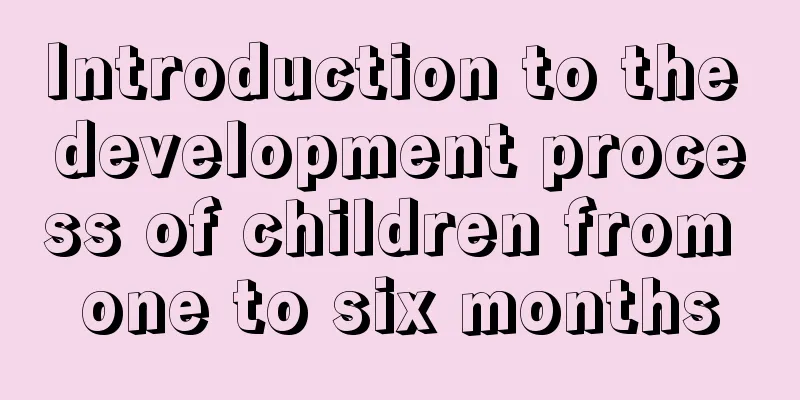Introduction to the development process of children from one to six months

|
Human beings themselves are very mysterious. From the tiny little ones when they are born, opening their eyes, and able to cry but not laugh or walk, and only lying down, to when they grow up and become big and able to cry, laugh, run, jump, sit and stand... everything is magical. Today, I am honored to share with you the development process of a child from one to six months old. Next is the time to witness a miracle. At one month old, the baby boy weighs 2.9 to 5.6 kg and is 49.7 to 59.5 cm long; the baby girl weighs 2.8 to 5.1 kg and is 49.0 to 58.1 cm long. When he is one month old, he can lie on his stomach and raise his head, with his chin off the bed for three seconds. He can focus on moving objects in front of him. He will be quiet when he hears sounds while crying. He can make sounds other than crying. He can hold a pen tightly with both hands. He can open his mouth and imitate speaking. At two months old, the baby boy weighs 3.5 to 6.8 kg and is 52.9 to 63.2 cm long; the baby girl weighs 3.3 to 6.1 kg and is 52.0 to 63.2 cm long. He will smile when teased. His eyes can follow objects moving horizontally. He can turn his head to look for the source of sound. When lying on his stomach, he can lift his head for a moment and turn his head freely. His fingers can open and close on their own and he can play with them on his chest. He will suck his thumb. At three months, the baby boy weighs 4.1-7.7 kg and is 55.8-66.4 cm long; the baby girl weighs 3.9-7.0 cm and is 54.6-64.5 cm long. When lying prone, he can lift half of his chest and support his upper body with his elbows; his head can be straight; he can look at his hands, hold them together, and grab clothes, hair, and face; his eyes can follow objects 180 degrees; he can smile when he sees people; he can answer questions, scream, and make long vowels. At four months old, the baby boy weighs 4.7 to 8.5 kg and is 58.3 to 69.1 cm long, while the baby girl weighs 4.5 to 7.7 cm and is 56.9 to 67.1 cm long. When lying prone, the baby's upper body is completely raised and perpendicular to the bed; the legs can be raised to kick off clothes and quilts and hanging toys; the vision is flexible and can shift from one object to another; the baby begins to babble and responds to adults' teasing with voice; and likes to eat complementary foods. A five-month-old baby boy weighs 5.3 to 9.2 kilograms and is 60.5 to 71.3 centimeters long. The baby girl weighs 5.0~8.4 kg and is 58.9~69.3 cm long. Can recognize mother and close people and respond to them; most children can roll over from lying on their backs to lying on their stomachs; can sit for a while leaning on a cushion and can straighten their backs when sitting; can stand with the help of adults; can put things in their mouths; can utter one or two consonants. At six months, the baby boy weighs 5.9-9.8 kg and is 62.4-73.2 cm long, while the baby girl weighs 5.5-9.0 kg and is 60.6-71.2 cm long. Head circumference 44 cm, two teeth have come out. The child can play with the feet and eat the toes; the head, torso and lower limbs are fully stretched out; the child can hold a toy in each hand steadily; the child can listen to sounds and see objects; the child can pronounce two or three consonants; the child can make familiar movements when adults recite nursery rhymes; the child can smile when looking in the mirror and touch the person in the mirror with his hands; the child can eat biscuits by himself and can chew them. The above is my introduction to the development process of children from one to six months. I hope it can help you understand the magic of the human growth process. Just looking at the text and imagining their movements will make people feel incredible. Parents must pay close attention to the growth of their baby, because this is also a wonderful journey. |
<<: What to do if your child has a fever at night
>>: What should I do if my child has a fever?
Recommend
What are the common methods of children's nutrition recipes?
Nowadays, more and more people pay attention to t...
Children's right brain development method
I believe that every mother regards our own child...
How long does it take for a baby to recover from bloating?
It is common for babies to have bloating. When th...
What should I do if my child vomits everything he eats or drinks?
When children vomit everything they eat, parents ...
What to do if your 11-month-old baby is restless at night
The physical health of the baby is an issue that ...
What is the reason for the newborn baby's face peeling?
Many parents are particularly worried about the p...
Is it normal for children to poop three times a day?
In general, the number of times people defecate i...
What to do if your baby has diarrhea due to bacterial infection
Many people suffer from diarrhea. A common cause ...
Causes of oral thrush in children
Many mothers may not know how to prevent oral thr...
How to treat prickly heat in children?
Prickly heat in children is a relatively common p...
Can teeth grow back if they fall out at the age of 15?
Everyone should know that each of us has a time t...
Why does infantile rash occur?
Many babies suffer from roseola when they are bor...
When is the teething period for babies?
Many families pay great attention to their baby&#...
What causes hemorrhoids in children?
Hemorrhoids are a relatively common intestinal di...
Effective ways to relieve cough in children
Children's resistance is relatively low, espe...









